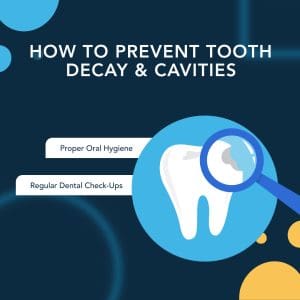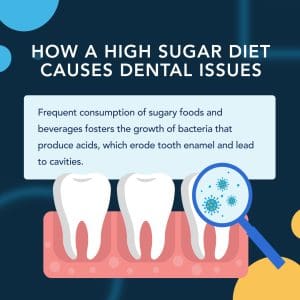Ensuring children’s dental health is essential for their overall well-being and laying the foundation for healthy adult teeth. However, kids are more vulnerable to certain dental health problems that can affect their development, comfort, and quality of life.
In this article, we’ll examine common dental health issues in children, such as cavities, gum disease, and tooth misalignment, and provide essential prevention strategies. From understanding the significance of early dental checkups to implementing daily oral hygiene practices, we’ll explain in detail how parents can effectively protect their children’s smiles for the future.
Why Is Children’s Dental Health Important?
Children’s dental health lays the foundation for healthy adult teeth and overall well-being. Proper dental care prevents common issues like cavities and gum disease, which can affect a child’s ability to eat, speak, and learn. Healthy teeth also contribute to self-esteem and positive social interactions. Early dental habits foster lifelong health, reducing the risk of chronic conditions associated with poor oral health, such as heart disease and diabetes, later in life.
The Role of Parents & Caregivers
Parents and caregivers play an essential role in establishing and maintaining their children’s dental health. As the first educators and enforcers of good oral hygiene practices, such as brushing and flossing, they ensure that these habits become part of their children’s daily routines. Additionally, parents are responsible for scheduling regular dental check-ups and making informed decisions about their child’s dental care, including dietary choices that minimize sugary snacks and drinks. Their active involvement is vitall in preventing dental problems and promoting a lifetime of healthy smiles.
Common Dental Issues in Children
There are many dental problems are common in children. These include tooth decay, which causes cavities, and gum disease, which often leads to gingivitis. Misaligned teeth and orthodontic issues are also frequent. All these dental issues can significantly impact a child’s eating, speaking, and overall health. Therefore, early detection and consistent dental care are necessary for maintaining a child’s oral health.
Tooth Decay & Cavities
Tooth decay and cavities are prevalent among children, primarily due to high sugar consumption and inadequate brushing and flossing. These cavities form when bacteria in the mouth break down sugar, producing acid that erodes tooth enamel. Regular dental check-ups and proper oral hygiene are essential to prevent and treat these common pediatric dental issues.
Gum Disease (Gingivitis)
Gum disease, particularly gingivitis, is a common problem among children. Its symptoms include red, swollen, and bleeding gums. This disease is caused by the buildup of plaque along the gumline, which irritates the gums. To prevent the onset and progression of gum disease and ensure healthy gums in children, it isimportant to maintain good oral hygiene, including regular brushing and flossing.
Dental Erosion
Dental erosion occurs when acids from foods and drinks wear away the tooth enamel. Frequent consumption of sugary, acidic beverages like sodas and fruit juices is a common culprit. This erosion can lead to sensitivity and increased risk of cavities, underscoring the importance of monitoring and moderating children’s dietary choices.
Early Childhood Carries
Early childhood caries (ECC) is a severe form of tooth decay that affects infants and young children. It’s often associated with excessive consumption of sugary drinks, especially when bottles are used at bedtime. Preventing ECC involves promoting good oral hygiene from infancy, including cleaning gums, brushing emerging teeth, and limiting sugary snacks and beverages.
Teething Pain
Teething pain is a normal part of childhood development as new teeth push through the gums, causing discomfort and irritability. Symptoms can include drooling, swollen gums, and a tendency to bite on hard objects. Managing teething pain can involve offering chilled teething rings, massaging the gums, or using over-the-counter remedies recommended by a pediatrician.
Dental Injuries
It is common for children to experience dental injuries, ranging from cracked or chipped teeth to completely knocked-out teeth, often during sports or play. When a child has a dental injury, it is necessary to seek prompt treatment to prevent further damage or infection. Using protective gear like mouthguards and ensuring safe play environments can greatly reduce the risk of such injuries.
Mouth Sores
Mouth sores, including canker sores and cold sores, are common yet uncomfortable dental conditions that many children face. These small ulcers can appear on the gums, inner cheeks, or lips, causing pain and irritation during eating or brushing.
What are the Risk Factors for Children’s Dental Issues?
Children’s dental issues can stem from a variety of risk factors. Poor oral hygiene practices, such as inadequate brushing and flossing, top the list. A diet high in sugars and acids contributes significantly to tooth decay and enamel erosion. Additionally, genetic predispositions and certain medical conditions may increase susceptibility to dental problems. Preventative care, including regular dental visits, can mitigate these risks and maintain oral health.
Poor Oral Hygiene
Poor oral hygiene is a primary risk factor for dental issues in children. Neglecting regular brushing and flossing allows plaque to accumulate, leading to tooth decay and gum disease. Establishing consistent oral hygiene routines early in life is essential to prevent these problems and promote long-term dental health.
 High Sugar Diet
High Sugar Diet
A high-sugar diet is a significant risk factor for children’s dental issues. Frequent consumption of sugary foods and beverages fosters the growth of bacteria that produce acids, which erode tooth enamel and lead to cavities. Reducing sugar intake and encouraging healthier dietary choices are crucial steps in protecting children’s dental health.
Lack of Fluoride
Lack of fluoride exposure is a notable risk factor for dental issues in children. Fluoride strengthens tooth enamel, making it more resistant to decay. Children who do not receive adequate fluoride, whether through water, toothpaste, or treatments, are at a higher risk of developing cavities and other dental problems.
Bottle Feeding at Night
Bottle feeding at night, especially with liquids containing sugars like milk or juice, significantly increases the risk of dental issues in children. As the child sleeps, liquid pools around the teeth, providing a breeding ground for bacteria that cause tooth decay. This condition, often termed “bottle rot,” can lead to severe cavities and dental health problems.
Snacking Habits
Frequent snacking, particularly on sugary or starchy foods, is a risk factor for children’s dental issues. Constant snacking does not allow saliva enough time to neutralize acids and clean teeth effectively, leading to increased plaque buildup and a higher risk of cavities. Encouraging healthier snacking habits and regular brushing can help mitigate these risks.
Genetic Factors
Genetic factors can significantly influence children’s dental health, predisposing them to various issues such as enamel defects, tooth decay, and misalignment. These inherited traits can affect teeth resilience against cavities and the development of jaw and tooth alignment, making some children more susceptible to dental problems than others.
Early Loss of Baby Teeth
The early loss of baby teeth poses a risk to children’s dental health. Premature loss can lead to misalignment of permanent teeth, as baby teeth serve as placeholders for adult teeth. Without them, adjacent teeth may drift into the empty space, causing crowding or misalignment, complicating future dental treatments.
Thumb-Sucking & Pacifier Use
Prolonged thumb-sucking and pacifier use are risk factors for children’s dental issues. These habits can lead to improper growth of the mouth and misalignment of the teeth, such as overbites or crossbites. If continued beyond the age of three, they can significantly alter the positioning of teeth and the jaw structure.
How Do You Prevent Children’s Dental Health Issues?
Preventing dental health issues in children involves teaching good oral hygiene practices from an early age, such as regular brushing and flossing. It is also important to ensure that their diet is balanced and low in sugary snacks and drinks. Regular dental check-ups are essential to monitor their development and identify any emerging problems early on. Additionally, educating children about the importance of dental care can help foster lifelong healthy habits.
Start Oral Hygiene Early
Starting oral hygiene early is pivotal in preventing children’s dental health issues. Even before the first tooth appears, gently wiping a baby’s gums with a soft, damp cloth helps clear harmful bacteria. As teeth emerge, introducing a soft toothbrush and fluoride toothpaste lays the foundation for a lifetime of good oral health practices.
Supervise Brushing
Supervising children’s brushing is important to ensure they use the correct techniques. This includes brushing for at least two minutes and reaching all areas of the mouth in circular motions. Providing guidance helps children learn the importance of thorough brushing and flossing, establishing effective habits that can prevent cavities and gum disease as they grow.
Introduce Flossing
Introducing flossing as a part of a child’s regular dental routine from an early age can help prevent dental issues and establish good oral hygiene habits. As brushing alone cannot reach every part of the mouth, flossing helps to remove food particles and plaque from areas in between teeth and along the gum line, preventing cavities and gum disease. By teaching children to floss daily, parents can help instill healthy dental habits that will ensure comprehensive oral care.
Use Fluoride Wisely
Fluoride helps in strengthening the tooth enamel, which makes it more resistant to decay. It is recommended to apply fluoride treatments and use fluoride toothpaste under adult supervision to ensure that children receive the protective benefits of fluoride without overexposure, which can lead to dental fluorosis. Striking a balance in the use of fluoride is important for developing strong and healthy teeth.
Limit Sugary Food & Drinks
Sugars contribute to tooth decay by fueling bacteria that produce harmful acids in the mouth. Encouraging healthier snack choices and minimizing the intake of candy, soda, and juice can significantly reduce the risk of cavities and promote stronger, healthier teeth.
Encourage Healthy Eating
Encouraging healthy eating habits plays a vital role in preventing children’s dental health issues. A diet rich in fruits, vegetables, and dairy products provides essential nutrients that strengthen teeth and gums. Reducing snacking and focusing on balanced meals also minimizes the frequency of acid attacks on teeth, further protecting against cavities.
Regular Dental Checkups
Regular dental checkups are vital for preventing children’s dental health issues. These visits allow professionals to monitor tooth development, identify potential problems early, and provide preventive treatments like fluoride applications and sealants. They also offer an opportunity to reinforce good oral hygiene practices, ensuring children maintain healthy teeth and gums as they grow. Find a pediatric dentist near me in Broward, County.
Avoid Bottle-Feeding at Bedtime
Avoiding bottle-feeding at bedtime can prevent many children’s dental health issues, such as early childhood caries. Milk or juice left in the mouth overnight can lead to significant tooth decay due to prolonged exposure to sugars, which bacteria in the mouth convert into harmful acids that attack tooth enamel.
Address Oral Habits
Addressing oral habits early, such as thumb-sucking and prolonged pacifier use, is important for preventing children’s dental health issues. These habits can lead to misaligned teeth and jaw development problems if continued for too long. Early intervention helps guide proper oral development and avoids the need for corrective orthodontic treatment later.
Model Good Behavior
Modeling good behavior is a powerful method for preventing children’s dental health issues. When children observe their parents or caregivers diligently brushing, flossing, and visiting the dentist regularly, they are more likely to adopt these practices themselves. Demonstrating a positive attitude towards oral hygiene can instill lifelong healthy dental habits in children.
Schedule Your Next Dental Checkup Appointment
Scheduling your next dental checkup with a Davie dentist is a proactive step toward maintaining excellent oral health and preventing potential dental problems before they become serious. Regular dental visits allow your dentist to perform a thorough cleaning, identify any early signs of tooth decay, gum disease, or other oral health issues, and provide necessary treatments promptly. Call our office to schedule your next dental checkup with a dentist in Davie, Florida.
August 19, 2024

 Adult
Adult




 High Sugar Diet
High Sugar Diet